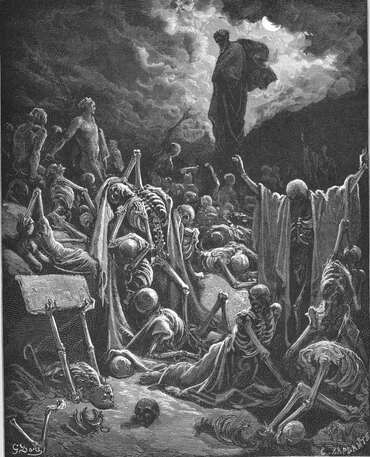19
내가 너희를 위하여 예비한 잔치의 기름을 너희가 배불리 먹으며 그 피를 취토록 마시되
5584. 'He said, The man issued a solemn warning to us' means the turning away from them of the spiritual from the internal. This is clear from the meaning of 'issuing a solemn warning' as the turning away of [the spiritual from the natural], for Joseph had warned them that they would not see his face unless their brother was with them (this warning is the threat of a turning away, for 'not seeing his face' means that no compassion will show itself, dealt with in the next paragraph); and from the representation of 'Joseph' as the Divine Spiritual, or what amounts to the same, truth from the Divine, dealt with in 3969, which at this point is the spiritual or truth flowing in from the internal since the expression 'the man' is used.

Bones are strong and supportive, providing a framework for our bodies and making motion and action possible. They are also the least "alive" part of our bodies, with much of their structure made up of a mineral matrix. As such, they represent a strong, supportive, functional but innately nearly dead part of our spiritual makeup: the "proprium."
The proprium is the part of us that feels life as our own, that perceives our loves and our thoughts as originating within ourselves. If we simply follow the proprium without looking to the Lord, it will lead us to a hellish state, in which we believe ourselves to be all-powerful and deny the existence of the Lord altogether.
Bones, on their own, will go dry, brittle and completely dead. If, however, we acknowledge the Lord and follow him, that's like putting flesh on the bones and being alive. In that case the bones – strong, supportive, protective and as alive as they can be – represent the proprium in relation to intellect, the part of us that perceives our thoughts as our own but turns them toward the Lord.